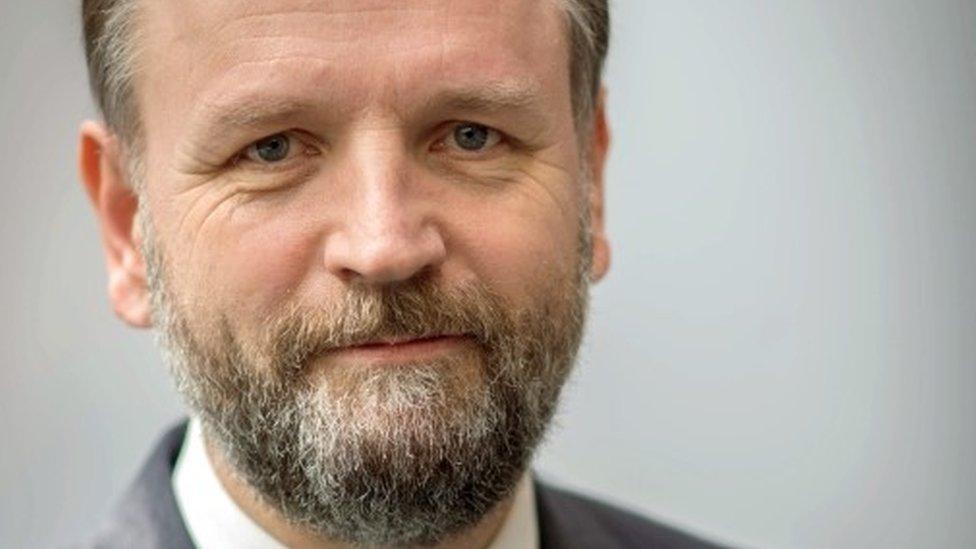NHS plans: Privatisation or progress?
- Published

Prof Hawking opposes the new plans
Few patients will have heard of it - not many NHS staff will know much about it - but there is a plan in the NHS in England some say is the most significant in decades.
It involves the collaboration between local health and social care groups that has evolved in some areas into the creation of organisations to bid for contracts.
Opponents say the process is opening the door to private companies - and undermining the fabric of the NHS in England.
Ministers and NHS leaders deny there is any such threat.
They are called accountable care organisations, external (ACOs) and they have evolved from Sustainability and Transformation Plans, external (STPs), which themselves caused controversy when they were unveiled in 2016.
A High Court challenge to the government and NHS England over ACOs, mounted by health campaigners including Prof Stephen Hawking, will now go ahead after leave for judicial review was granted by a judge.
Stephen Hawking to take NHS's Hunt to court
Stephen Hawking: I'm worried about the future of the NHS
Stand by for a quiet revolution in the NHS
The Department of Health and Social Care said the claims in the action would be resisted and it was "scaremongering" to suggest ACOs were a privatisation vehicle.
The origin of these organisations lies in the Five Year Forward View, external plan for NHS England published by chief executive Simon Stevens and colleagues in 2014.
That plan said: "The traditional divide between primary care, community services and hospitals - largely unaltered since the birth of the NHS - is increasingly a barrier to the personalised and co-ordinated health services patients need."
In a speech last year, Mr Stevens followed it up by saying: "We are now embarked on the biggest national move to integrating care of any Western country."
This thinking drove the formation of 44 STPs across England.
Moving patients from hospitals
Local health chiefs and council leaders who run social care were tasked with working out how best to look after patients in the community and away from hospitals at a time of rising cost pressure on the services.
Supporters of the process say it boosted collaborative working and joined-up care. Critics found that in some areas hospital ward closures were planned.
The STPs deemed to have been the most successful have morphed into what are known as accountable care systems (confusingly not the same as accountable care organisations).
April sees the formal launch of 10 such systems, under which the different local partners take formal responsibility in their area for controlling resources and ensuring the NHS meets national standards.
The rest of the 44 STPs are in varying health. In some, local co-operation has stalled. Others, say NHS England, could still become accountable care systems.
The key difference between these systems and ACOs is that the latter will sign formal contracts for the delivery of health and social care in their areas.
So far, Dudley and Greater Manchester are the only ones bidding for this status - but there are likely to be more considering it.
The aim is to abolish the so-called purchaser-provider split, under which health commissioners in England pay hospitals and other trusts for the care of their local patients.
All health needs
The long-term goal could be a "capitated payment" mechanism whereby a single health organisation is paid a lump sum per patient to cover all their health needs.
Critics have asked who the accountable care organisations will be accountable to.

Simon Stevens wants a more integrated care system
They argue there has been no parliamentary approval for this model of care.
They have pointed out that the ACO terminology is used to describe healthcare providers in the American health system.
They say that under tendering regulations, the contracts will have to be opened up to all-comers, including private bidders.
One of the campaigners launching the legal action with Prof Hawking, Dr Colin Hutchinson, who chairs Doctors for the NHS, said: "There needs to be a sound legal basis before 10-year contracts worth billions of pounds are outsourced to these new organisations.
"We are delighted that the court has decided that our arguments deserve to be examined in detail."
On the other hand, Chris Ham, of the King's Fund think tank, argues that, in practice, the bidders to run ACO contracts are unlikely to come from the private sector.
He said: "Rather than opening up the NHS to increased privatisation and competition, as some have claimed, accountable care is likely to have the opposite effect.
"The main participants involved in developing accountable care are NHS organisations and partners in the public sector."
Aware of the controversy, the Department of Health and Social Care and NHS England have announced a period of consultation.
The Commons Health Select Committee is carrying out its own investigation, and ministers seem set to pause and reflect on the committee's report.
Some who submit their opinions will argue that ACOs are a natural extension of plans to end the fragmentation of care and will improve patient care.
Others will say they threaten the very foundations of the NHS in its 70th birthday year.
Stand by for a passionate debate.